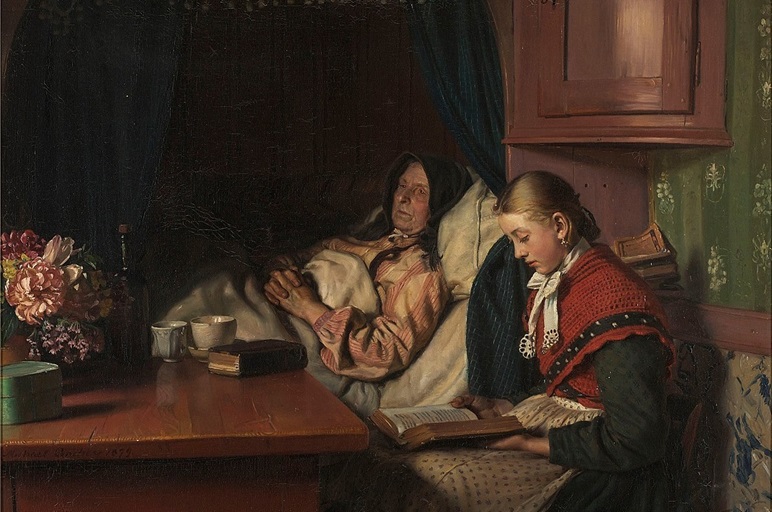.
Three Cascading Endings on Fallen Civilizations
I.
Everywhere, the sands are endless. Look:
A joke is made of all my glory. On
Stone once sculpted in my image, my
High authority, my grandest works’
Marks, have vanished. On my visage, ye
See my ancient sneer. I, who was mighty,
Society has mocked, forgotten; and
Sand buries my success in time’s despair.
.
II.
Nightmare, this colossal ruin: what
But wreck remains? Just one pitiless, rough,
Shuffling brute bulldozing bricks: a beast
Obsessed with endless demolition. Its
Ruts make paths through desert sands. Each hour,
Fewer shapes remain. What doom has come?
Combing through time’s remnants, plowing round
Groundless civilizations, the monster’s at
That task a second time. Is it the last
.
III.
Vast, passionate force, intensely moving toward the
Ignored—the unheard—merging of the lone
Bone-and-flesh center-holder and
Manned lion bringing revelation? Level
Gravel, crumbled long ago to sands,
Expands across vexed centuries that stretch,
Touching history’s horizon’s far
Star, where human progress fades away.
.
.
May Memorial
I.
Dazed, she walks from room
To room to raise the blinds
That let the daylight in.
She sees the sky assume
The bleeding gash that blends
Last night with dawn. Some thin
Cloud-gauze binds nighttime’s gloom
Behind it; yet she finds
Twelve passing months have been
No help to heal her wounds.
No morning shines much light where
Her mourning casts death’s shadow—
Darkest when high noon’s
Sharp ray invades her nightmare.
Even Spring seems hollow:
Its cheery feathered tunes,
May’s brilliant sun-washed air,
Insult her year-long sorrow.
She sees wildlife resuming
Lives of purpose; choral
Birds build pleasant nests where
Bridal trees are blooming
With white and pink and coral
Tiaras. Once her hair
(Which is now becoming
Too thin to hold a floral
Coronet) once wore
Bright blossoms.
____________Weary, aware
Of lonely times that loom,
She contemplates the squirrels
Free from any cares.
Bird couples, bride and groom,
Know not of deaths or burials.
Their flawless instinct spares
Their lives from any gloom;
Carefree animals
Chant their morning prayer
Able to assume
There are no funerals.
.
II.
She walks from room to room
Closing blinds. Relief’s
Nowhere. Nightfall’s stark
Silence echoes doom.
Every youthful leaf’s
Dance has slowed. Swift dark
Invades the living room,
Surreal against her grief’s
Backdrop. The last blinds click
To veil one final window.
On her drama of lost love,
Day’s closing curtain’s drawn,
Evoking every shadow
Of all the people who’ve
Left her here alone.
.
.
Cynthia Erlandson is a poet and fitness professional living in Michigan. Her third collection of poems, Foundations of the Cross and Other Bible Stories, was released in July, 2024 by Wipf and Stock Publishers. Her other collections are These Holy Mysteries and Notes on Time. Her poems have also appeared in First Things, Modern Age, The North American Anglican, The Orchards Poetry Review, The Book of Common Praise hymnal, The Catholic Poetry Room, and elsewhere.
Discover more from Society of Classical Poets
Subscribe to get the latest posts sent to your email.

















In the first poem I sense an allusion to Shelley’s “Ozymandias” in the first stanza, and in the second stanza one to W.B. Yeats’s “The Second Coming.” The “ancient sneer” and “I, who was mighty” clearly recall Shelley’s broken statue of a long-dead Pharaoh; and Yeats’s “rough beast” destroying and demolishing things is clearly referenced in the second stanza. If there is another literary allusion in the third stanza, it escapes me.
I think “May Memorial” is the better poem, but that is just a personal opinion. It is extremely sad, and about a lonely old woman, forsaken in her house, thinking of things long past, and even the coming of Spring cannot lift her out of despair. This makes the poem a testament to the pain of a human person, and this can be more immediately touching than a meditation on the collapse of civilizations.
Nevertheless, both poems are excellent work.
Something else going on in the first poem is the rhyme scheme of the last word in the line rhyming or half-rhyming with the first word of the next. It creates an effect, beautiful and disturbing. These last words also spell out lines from the two poems you identified, Joe.
I’m grateful to you, Evan, and to Dr. Salemi, for taking the time to understand the strange form I was trying. I was in a mood to do something different.
What is the name of the form that uses such a rhyme scheme?
A famous poem of such form is “Incantation,” which begins, “Fain we ask Erin/ Faring o’er oceans’/Motions….”
Thank you so much, Joseph. You are absolutely right about “Ozymandias” and “The Second Coming”. This one was a weird experiment, and I’m very happy that important aspects of it came through to you. The third section returns to “Ozymandias”, as the “cascading” end-words read “The lone and level sands stretch far away.”
Ooops — I guess I didn’t click on “Reply”; my reply to you came through below.
How cool, I had to read the first poem three times before I figured out how the title points to the additional narrative that is obtained by reading the downward cascading words at the end of each line. A very fitting poem for the times in which we live.
Thank you very much, Yael. I’m grateful that you took the time to read it three times! Yes, I did think it was a fitting subject for our times, though I wonder if there have been any times when it would not have been fitting, at least in some places in the world.
The cascading endings challenge the reader, Cynthia. This first poem is apocalyptic again and again, which in theory shouldn’t happen. But then you are not doing an “unveiling,” with most of these “groundless civilizations” already founded in nothing but sand. I do like describing them with the term “groundless,” because “ground” that could support civilization would need much more substance than sand. You are right that our present busy social organizations seem to have forgotten the former substantial civilization on which they were founded. and seem about to vanish into sand that preserves little worth remembering.
“May Memorial” focuses rather on a living individual who seems to be observing the traditional custom of a year’s mourning for a widow. Obviously, the year of nature brings her no growth or relief. And in the end we find out that it is not one other, but “all the people who’ve left her here alone” who have created her surreal drama of lost love. While this could seem apocalyptic in relation to the previous poem, for one person the situation is rather despair–or so I read. A good pair of distinctive poems on interrelated themes.
Thank you for your insights, Margaret. You’re right that the cascading endings are “challenging”, and I’ve been aware all along that they may be asking too much of the reader, which is one reason I was afraid it might just go over like a lead balloon; but I wanted to do something different, perhaps get out of a rut. It’s interesting that you wondered whether the themes of these two poems were interrelated; I hadn’t intended them to be, although in a sense they’re both about lost worlds.
I was too dense to pick up how the endings work in the first poem, but now that others have pointed it out, it’s amazing to see a poem that can be read in 2 dimensions. Extremely clever and creative.
I’m sure you weren’t being “dense” at all, Warren; as I said to Margaret, I wasn’t sure if what I was trying to do would work, and was a litte surprised that some figured it out. Thank you so much for taking time, and for your compliments.
Mary, it’s fascinating that you know of another poem with this odd rhyme scheme. Do you know the author of “Incantation”? I don’t know what the name of the rhyme scheme is; perhaps someone here will, though.
I don’t know the author or when it was written. You can find it at https://lib.wildla.in/books/A%20Reformed%20Druid%20Anthology.pdf . Scroll to page 22.
Thank you, Mary.
Clever, thought-provoking, inspirational and beautiful… what more could a reader ask? Cynthia, thank you for your passion – it shines through in your poetry!
Thank you so much, Susan! Your poetry inspires me, too.